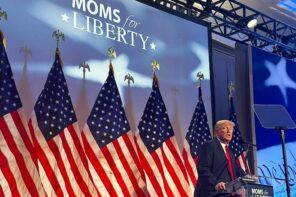Independence Day: always a good time to catch up on reading! So here’s RD’s theme for the day: the misuse of history in service of a religious or political plan.
Whether it’s the muddled mindset of a couple of failed GOP aspirants, a collectively amnesiac take on Mormonism, or the selective history-writing of the U.S. Conference of Catholic Bishops, it does all come down to liberty—or rather, taking liberties. You know, with facts and stuff.
Wishing you a happy, reflective 4th.
—The Eds.
__________________________
RD’s JULY 4th READING LIST
The Quixotic Task of Debunking David Barton
PAUL HARVEY • Jun 3, 2012
The reason all the refutation in the world will have little or no effect on Barton’s target audience is that his book, The Jefferson Lies, is not really about Jefferson at all; it’s about Barton’s own skewed view of the context of historical scholarship and the academic enterprise—and, for that matter, of what constitutes “truth.”
Mitt Romney and the Ghost of Anti-Mormonism
JOANNA BROOKS • May 2, 2012
The anti-Mormonism that was nearly universal during Smoot’s era is now a tradition maintained by a very small slice of the American population. The Republican primaries gave that small slice a megaphone: the artificial loudness of their voice makes people overestimate their number.
It’s Barack v. the Bible, Says Barton
PAUL HARVEY • Mar 9, 2012
David Barton summarizes it succinctly: “Many of these actions are literally unprecedented—this is the first time they have happened in four centuries of American history. The hostility of President Obama toward biblical faith and values is without equal from any previous American president.” Roll over, Thomas Jefferson.
The Heresy of Compromise
PETER MANSEAU • Feb 27, 2012
Jefferson did not believe religious ideas should be considered untouchable, or too fragile to approach. They should instead be discussed and debated, like any other ideas in a democracy, with respect to all, and with the awareness that no side—religious, non-religious, or indifferent—has a monopoly on the concerns of conscience. To truly support religious liberty, one must never forget that what one person calls heresy, another simply calls choice.
Conservative Christianity and Its Discontents
RANDALL J. STEPHENS AND KARL GIBERSON • Mar 13, 2012
The amateur historians, biologists, and social scientists who produce alternative curricula for evangelicals speak as beleaguered culture warriors. They offer winsome personal testimonies and refer to the Bible so often that it can sometimes seem as though their ideas actually come straight out of the Bible.
Judeo-Christian America: The Fall of the ‘Christian Nation’
EDWARD J. BLUM • Aug 31, 2011
Having had a conversion to evangelical Protestantism in the 1980s, I became convinced in the early 1990s that “liberal secularism” was destroying the nation and its educational system. I was determined to use history to fight back.
Founding Father John Adams’ Advice to Rick Perry: Don’t Meddle in Religion
WARREN THROCKMORTON • Jul 31, 2011
While the governor may find rousing support from his peers, declaring to the nation in a presidential race that our problems can only be solved by a narrowly-conceived conservative protestant Jesus will, I suspect, court the suspicion and resistance experienced by John Adams. For his own good as well as the good of his constituents, Perry should take some wisdom from a Founding Father and call the whole thing off.
God’s Law is the Only Law: The Genesis of Michele Bachmann
SARAH POSNER • Jul 11, 2011
In Titus’ view, the First Amendment prohibition against Congress establishing a religion was actually intended to prevent Congress from establishing institutions that he maintains are tantamount to a religion, like public education, or National Public Radio. “I don’t believe what they teach in public schools,” Titus told his IOTC audience. “They don’t even believe in the first thing—that God is the source of knowledge.




